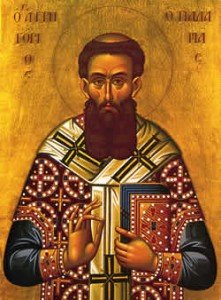St Gregory Palamas, one of the truly outstanding Greek Fathers, teaches us that it was none other than Christ Himself that was revealed first and foremost in history precisely because it was He, and not the Father or the Holy Spirit, Who was to become flesh. In other words, because it was the will of God the Holy Trinity to save us by coming as the Messiah, by being Incarnated in the Person of Jesus, Who is also the Son of God.
But if it is indeed true that “Whoever has seen me has seen the Father”, and that “no man can say that Jesus is the Lord but by the Holy Spirit, then the revelation of Christ must at the same time be a revelation of the Holy Trinity. Gregory teaches us that the Christocentric character of God’s dispensation towards man should not blind us to the great mystery of the unity and common action of the Holy Trinity. Ultimately, in other words, Christology and Trinitarian theology are one and the same doctrine. What the three persons do, they do together, in unison.
Another Gregory, Gregory of Nyssa, teaches this:
We do not learn that the Father does something on his own, in which the Son does not co-operate. Or again, that the Son acts on his own without the Spirit. Rather does every energy which extends from God to creation… have its origin from the Father, proceed through the Son, and reach its completion in the Holy Spirit?
Here we have the classic schema of the divine economy: from the Father, through the Son, in the Holy Spirit – the divine operation of the Most Holy Trinity is always from the Father, through the Son, in the Holy Spirit.
But the fact remains that the distinction of persons, the diversity in God the Holy Trinity, is also necessary to maintain since only one of the Three Divine Persons became man; only one of the Holy Trinity was born and crucified, though this is accomplished with the consent of the Father and the Holy Spirit. It is true, of course, that the Father gives His only-begotten Son and the Holy Spirit testifies of Him as Lord and God. But the distinction of persons remains. We see this most concretely in the mystery of the Divine Eucharist, where the Spirit is present in Holy Communion as well as the Son, but it is a different kind of presence: the Spirit did not become human. (More to come)

